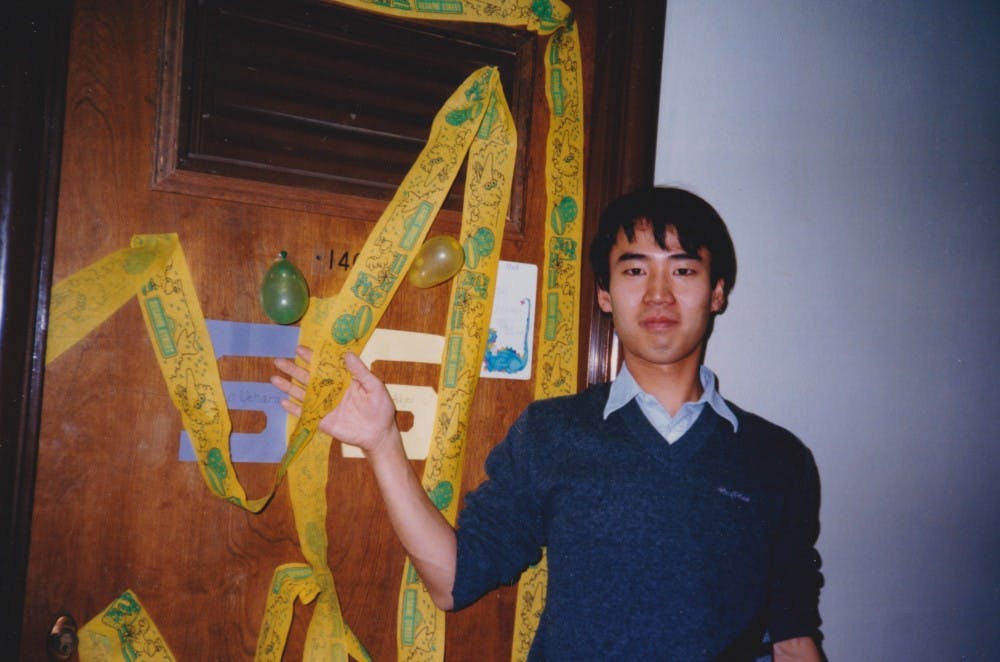Forestry, though sometimes underrated, is a great recreational activity to provide peace of mind. It allows one to connect with natural forest environment on a meaningful level, while in an open, secluded area.
The study and experience of forestry can be a source of counsel, relaxation and rehabilitation. MSU was originally established as a state agricultural and mechanical college, so there is a deep connection between the topic and the university.
No one can vouch for this more than MSU visiting scholar Iwao Uehara, a part-time forestry instructor at the college. Uehara, whose first name literally translates to “Big Rock” in Japanese, has many years of experience studying in both Japan and the U.S.
The 55-year-old nature aficionado has ties to MSU through the perspective of both a student and member of faculty. As of 2017, he is a resident of Shaw Hall and is a part-time instructor in the Department of Forestry.
Born in 1964 and a native of Nagano, Japan, Uehara traveled to Michigan through a foreign exchange program and came to MSU as a student in 1986. Being that his program only allowed a few students to study abroad in America, Uehara was fortunate enough to be selected to participate.
“I (was) a university student in Tokyo," Uehara said. "Tokyo University of Agriculture and MSU became sister schools in 1966. Every year, three students can come to MSU by supporting my university. ... I did not have experience living in other countries by 1986. I wanted to live in other countries, I wanted to study in other countries, so I got prepared to study here. Every student needed to take examination to study at MSU. The English and general examination were required, and I passed them. Three students were allowed to come to MSU. At that time, 60 students applied. ... Now, it has changed.”
A resident of Landon hall his freshman year, Ueharais a true Spartan that bleeds green and white. A distinguished outdoorsman, Uehara’s expertise is a fine addition to MSU’s nature community. His insight, knowledge and passion has certainly provided excitement for the Department of Forestry.
Prior to his studies at college, Uehara lived with a couple of host families in Michigan. Each of these families made their living through work in agriculture. They included timbering, a dairy farm and a Christmas farm. Though the emphasis on agriculture living hits home for Uehara, he was surprised by the difference in forest-land when comparing Michigan to his native homeland.
“The biggest difference between Michigan forests and the Japanese forests was natural regeneration,” Uehara said. “In Michigan, most of the forests are naturally regenerated forests, not artificial.”
Later, during his time at MSU, he spent one year studying at the college’s Department of Forestry.
In this program, it is rare for foreign exchange program students to return to their American university as a lecturer. There have been many members in the TUA program that have visited MSU annually, but none have had the ability to teach as an instructor.
Being that Uehara is involved in the environment, his goal is to spread the for forest therapy and its potential in America. Taking the values and teachings from his homeland is a task that he has undertaken in an effort to share his passion.
Any individual that studies abroad in a different country is bound to experience a sense of culture shock. Taking into account the transition from Tokyo to America is bound to come with distinct difference in student life. When asked about the biggest difference between Japanese and American students, Uehara gave a response to the difference in student mannerisms.
“The MSU students come very early for the class, even 7:30a.m, I was surprised," Uehara said. “It was amazing for me. Also, in U.S. classes, students have many questions. In Japan, do not ask questions to (the) teacher or in lecture."
Richard Kobe, chairperson for the Department of Forestry and professor of ecology remarked the opportunity to gain Uehara’s acquaintance has been a treat. Apart from his passion, Kobe found Uehara’s excited, energetic enthusiasm the most admirable quality of his work.
“His presence here is terrific because it points to some connections of forestry to health, especially mental health, that are not always obvious to people,” Kobe said. “The work that Dr. Uehara has been involved in Japan where he brings people into the forest and what he calls forest therapy, has shown to decrease people’s stress levels, there's decrease of stress hormones in human saliva. It can be very effective, including programs that involve youth that are disadvantaged or at risk and are brought into the forest environment and are able to shift things to get a much better start.”
Uehara will stay at the university until the end of October before returning home to TUA. Students interested in learning more about the study of Forestry can visit his office on campus in Room 208 of the Natural Resources Building.
Support student media!
Please consider donating to The State News and help fund the future of journalism.
Discussion
Share and discuss “Department of Forestry instructor has unique, historical ties to Tokyo and MSU ” on social media.







